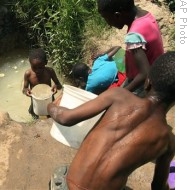voa标准英语2008-Cholera Epidemic in Zimbabwe Continues to Worsen(在线收听)
U.N. and other aid agencies have been working to contain the spread of the cholera outbreak since well before the government declared a national emergency this week. U.N. officials said the situation could hardly be worse. The needs are huge and operations to make things better will be very costly.
 |
| Children collect water from a well in Harare, Zimbabwe, 05 Dec 2008 |
United Nations figures put the number of suspected cholera deaths at more than 500 and the number of confirmed cases at more than 12,000. A Spokeswoman for the World Health Organization, Fadela Chaib, said those most at risk of getting ill and dying are women and children, people who are malnourished and have little access to good water and sanitation.
"The health infrastructure in the country is very weak. And, people who are going to get treatment in health centers are likely not to get the treatment they need because of lack of health workers and lack of supplies and medicines," she said.
The World Health Organization notes the fatality rate of more than four percent is extremely high and remains a serious concern. The epidemic is affecting nine of Zimbabwe's 10 provinces. The capital city, Harari, is worst hit.
But, aid workers acknowledge little information is available about the course of the epidemic outside of the country's three largest cities. They worry that cholera may be more extensive than what is now known.
Spokeswoman for the U.N.'s Organization for the Coordination of Humanitarian Assistance, Elizabeth Byrs, said U.N. and private aid agencies are redoubling their efforts to combat this disease. But, she said they are hampered by shortages of practically everything.
She said the country lacks fuel. It has huge logistical problems. It lacks technical staff to treat people and volunteers to spread the hygiene message to the population. She said even the most basic supplies, such as dishes, cups and spoons are missing in hospitals and clinics.
The cost of combating this epidemic is likely to be huge. For example, the U.N. Children's Fund said the agency spent $5 million just last week to provide clean water to people.
UNICEF anticipates it will need a great deal more money to carry out its humanitarian operation. But it is concerned that it might not get the needed resources. It said so far it has received nothing in response to a $9 million appeal it recently launched for emergency activities in Zimbabwe.